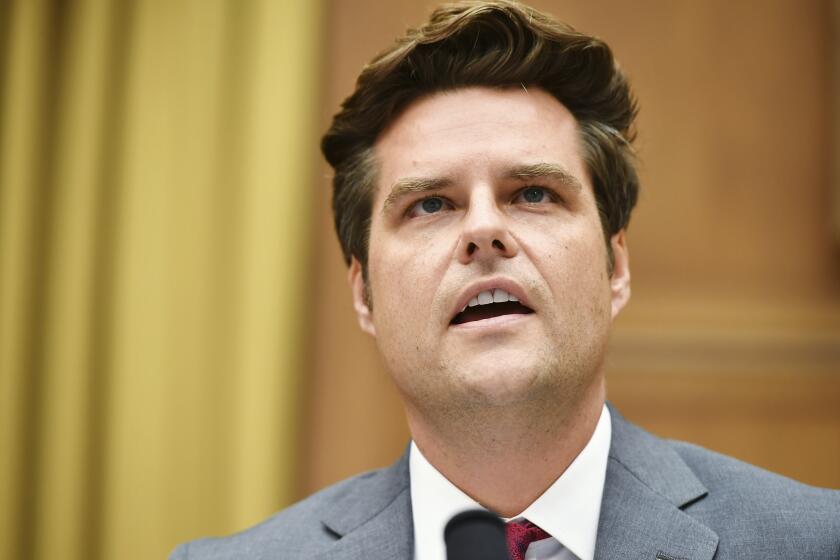Different in style as well as substance
WASHINGTON — One is hot, the other cool. One is a man of quick action, the other a man of abiding caution. One claims the role of national maverick; the other hopes to play the role of national mediator.
The choice between John McCain and Barack Obama is not only between contrasting parties and policies; it’s also between two markedly different styles of leadership. Those contrasts were sharply evident Friday as the presidential candidates sought to show how they would lead the nation through its latest harrowing financial crisis.
Sen. McCain (R-Ariz.) heatedly called on the Federal Reserve to stop bailing out big financial firms, proposed a new agency to “fix them before they become insolvent,” and vowed to stamp out “corruption and unbridled greed” on Wall Street.
Sen. Obama (D-Ill.) announced that he had decided not to issue a financial rescue plan -- because he wanted to give the Bush administration a chance to work out a bipartisan solution without political interference.
“It’s about their leadership styles,” said Stanley A. Renshon, a scholar of the presidency who is also a psychiatrist. “McCain is a man of trying to do things. Obama is a man who tends to act cautiously and prudently. . . . It’s not that one approach is necessarily better; they both come with advantages and risks.”
This week’s debate over the financial crisis wasn’t the only time those differences have come to the fore.
When Russian troops invaded neighboring Georgia last month, McCain immediately denounced Russia and demanded a withdrawal. “We are all Georgians,” he declared. Obama urged both sides to show restraint and did not initially condemn the Russian action -- although he later issued a statement chiding Russia.
Even Hurricane Gustav, which swept across the Gulf Coast three weeks ago, brought different responses. McCain detoured to Mississippi to tour the state’s Emergency Management Agency; Obama stayed away, saying a sudden visit might “draw resources away from folks on the ground.”
The candidates’ snap reactions to unexpected events can offer “an insight into the real person behind the campaign ads,” said Michael A. Genovese, an expert on presidential leadership at Loyola Marymount University. “How do they respond to rapidly changing events? How well can they think on the run?”
And their responses to the financial meltdown have been particularly interesting, scholars said, because neither candidate is considered an expert on economic regulation.
McCain acted first but suffered several false starts. On Monday, he declared that “the fundamentals of our economy are strong.” On Tuesday, he said that the economy, while strong, was in “crisis” and that he opposed a federal bailout of insurance giant AIG. On Wednesday, after the federal government announced that it would take over AIG, he said the action was unavoidable.
On Thursday, he said he’d fire the chairman of the Securities and Exchange Commission, Christopher Cox. (A president appoints but can’t fire an SEC chief, though he can apply pressure to resign. The White House said President Bush had confidence in Cox.)
On Friday, after Treasury Secretary Henry M. Paulson announced a broader bailout plan, McCain outlined his own.
Obama took fewer clear positions, though he did lambaste McCain for calling the economy strong. He initially avoided passing judgment on the planned takeover of AIG and left it to a campaign spokesman to explain later that the candidate “does not second-guess the Fed’s decision.”
By the end of the week, he had declared his support for the Bush administration’s efforts to solve the problem but added that any solution for Wall Street “must also help Main Street.”
On the surface, the candidates’ responses merely tracked their major themes. McCain has been trying to establish his independence from Bush and cast himself as a populist reformer -- hence, it would seem, his attacks on Bush’s SEC chairman and the proposal to bail out AIG.
Obama has been trying to reassure nervous voters that a 47-year-old first-term senator has the experience and gravitas to lead the nation -- hence his deference to the Treasury and the Federal Reserve, though they are led by GOP appointees.
But Renshon, who teaches at City University of New York, sees deeper reflections of the candidates’ styles in their reactions this week.
McCain, he noted, has frequently rebelled against established orthodoxy, especially in his own party. Obama, he said, is more cautious -- and more likely to stick with his party’s usual position.
In this case, Renshon said, “McCain is saying: ‘The big guys are against you, and I’ve never liked them anyway.’ There’s an element of outrage in what he says.”
Citing McCain’s call for Cox to be fired, which the Wall Street Journal pronounced “unpresidential,” Renshon said: “He is so far out in front in what he’s saying that he sometimes throws prudence to the wind -- not in the sense that he’s reckless, but in the sense that he’ll take risks.”
Obama, he noted, has often been characterized as reluctant to commit to a position. “He sometimes appears to favor both sides of a proposition as he listens and talks to people. You don’t always know where he is. He’s his own inkblot,” Renshon said.
“In a campaign, that’s magnified by the anxiety of making a false move. If he comes out too far in front of anything, he’ll get hammered.”
--
Times staff writer Janet Hook contributed to this report.
More to Read
Get the L.A. Times Politics newsletter
Deeply reported insights into legislation, politics and policy from Sacramento, Washington and beyond. In your inbox three times per week.
You may occasionally receive promotional content from the Los Angeles Times.











